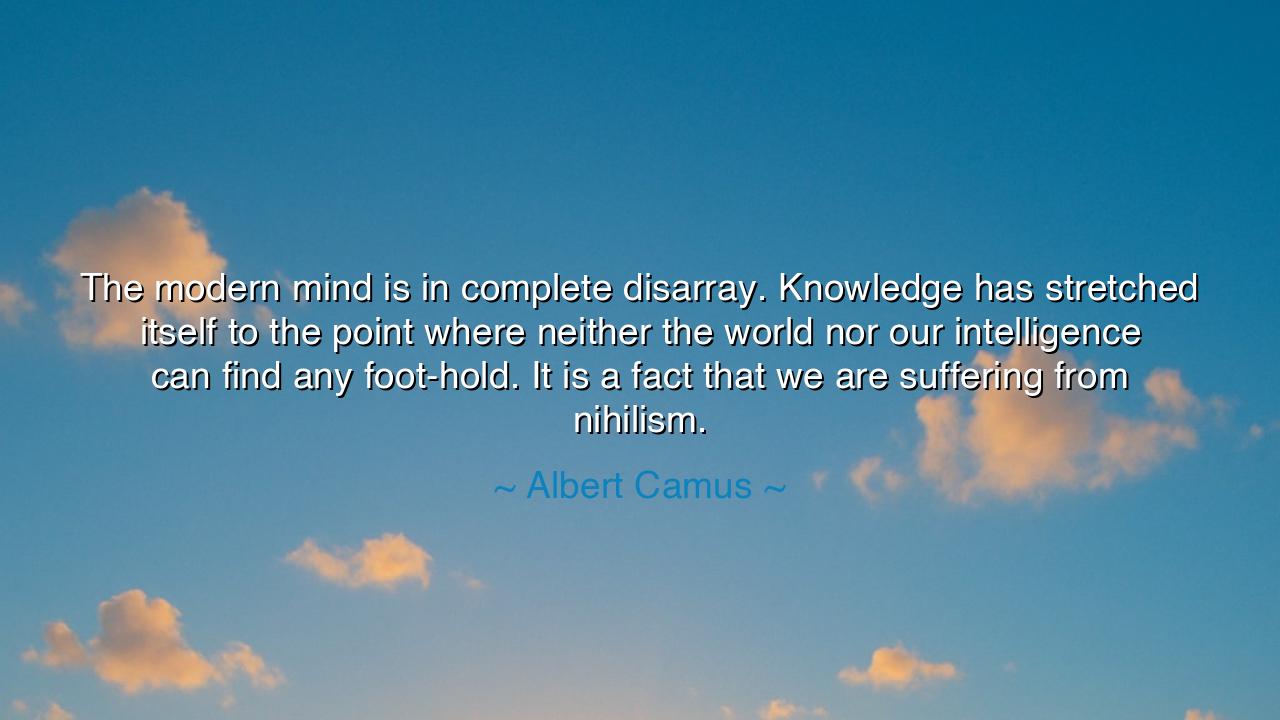
The modern mind is in complete disarray. Knowledge has stretched
The modern mind is in complete disarray. Knowledge has stretched itself to the point where neither the world nor our intelligence can find any foot-hold. It is a fact that we are suffering from nihilism.






The Abyss of the Modern Mind
From the philosopher and prophet of the absurd, Albert Camus, comes this grave and luminous truth: “The modern mind is in complete disarray. Knowledge has stretched itself to the point where neither the world nor our intelligence can find any foothold. It is a fact that we are suffering from nihilism.” In these words, Camus captures the silent crisis of the modern age—a sickness not of the body, but of the soul, born from too much knowledge and too little meaning. He speaks as one who has seen the mind’s triumph turn to confusion, and the pursuit of truth dissolve into despair. His voice is not the voice of condemnation, but of sorrow—for he witnessed a world illuminated by intellect, yet starved of purpose.
The meaning of this quote lies in its warning against imbalance. Humanity, in its hunger to know, has reached out to the furthest edges of the universe, split the atom, mapped the brain, and measured the stars. Yet in doing so, it has forgotten to measure the heart. Knowledge, when severed from wisdom, becomes like a weapon without a wielder—sharp, powerful, but directionless. Camus saw that the modern mind, dazzled by progress, had lost its center. We know how to build machines that think, but we have forgotten how to think about what is worth building. We have conquered nature but lost harmony with it. Thus, as knowledge grows outward, meaning collapses inward, leaving us suspended between brilliance and emptiness.
The origin of these words can be traced to Camus’s confrontation with the age of the absurd—the twentieth century, when faith in reason and progress was shattered by war, genocide, and moral collapse. The thinkers of his time—scientists, philosophers, and statesmen—spoke of advancement, yet the same intellect that invented vaccines also built bombs that erased cities. In this contradiction, Camus saw the truth of nihilism: that man, having dethroned God and exalted knowledge, found himself master of the universe but stranger to his own soul. The world no longer spoke to him in symbols of meaning—it was silent, indifferent. “We are suffering from nihilism,” he declared, not as accusation, but as diagnosis. The sickness of the modern age is not ignorance, but disconnection—knowledge without love, progress without purpose.
History bears witness to this peril. Consider the story of J. Robert Oppenheimer, the father of the atomic bomb. A man of immense intellect, he harnessed the power of the atom—knowledge once reserved for the gods. Yet when the first bomb was tested, he recalled the words of the Bhagavad Gita: “Now I am become Death, the destroyer of worlds.” In that moment, he saw the terror of unanchored knowledge—the triumph of science that had lost its soul. Like Camus, he realized that intelligence alone cannot guide the heart. Without a moral compass, the light of reason becomes the flame of destruction.
But Camus was not a pessimist. Beneath his lament, there burns a quiet defiance—a call to rebuild meaning from the ashes of nihilism. If knowledge has stretched too far, then we must restore balance by turning inward. The foot-hold we have lost in the outer world must be found within. Camus taught that even in a universe without ultimate answers, man can choose to live with integrity, courage, and compassion. He can create his own meaning, not through blind faith, but through honest engagement with life. The world may be silent, but the heart can still sing. Thus, intelligence finds its redemption not in knowing everything, but in caring deeply.
The lesson of Camus’s wisdom is this: do not mistake knowledge for understanding, nor intelligence for wisdom. Seek not only to learn, but to live rightly. Let your studies be guided by conscience; let your curiosity be tempered by humility. When the world feels meaningless, resist the despair of nihilism by creating meaning through action—through kindness, through art, through truth. For meaning is not given; it is made. It is born each time a human being chooses love over apathy, creation over destruction, faith in life over the emptiness of nothingness.
Therefore, O seeker of truth, let your mind stretch far, but let your soul stay rooted. Gather knowledge, but do not let it consume you. Remember that intelligence without compassion is a desert, and progress without purpose is a fall disguised as ascent. The modern mind may be in disarray, but the ancient heart still remembers the way. Reconcile the two within yourself—let the intellect seek understanding, but let the soul give it direction. In this harmony lies the cure for nihilism, the restoration of balance, and the rebirth of wisdom in a world that has forgotten how to feel.
And when you walk through the chaos of the modern world, carry this truth as your compass: knowledge is vast, but meaning is vital. For in the end, it is not what we know that saves us, but what we choose to cherish.






AAdministratorAdministrator
Welcome, honored guests. Please leave a comment, we will respond soon